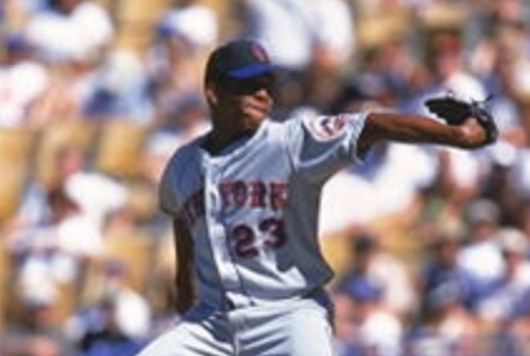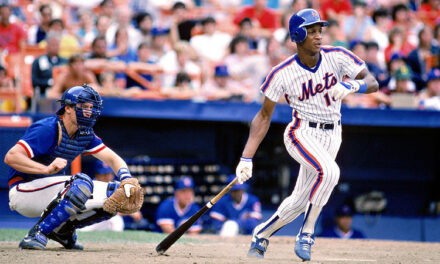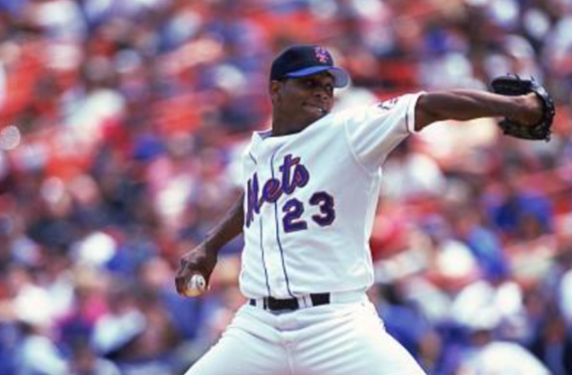
Among all-time New York Mets relief pitchers, only four have posted the following stats in a season:
- 8 or more wins
- ERA+ of 120 or greater
- Opposing batting average below .200
- Strikeouts-per-nine of 7.0 or greater
Tug McGraw (twice), Skip Lockwood, Jesse Orosco and Pat Mahomes.
Mahomes, 47, pitched two seasons with the Mets in 1999 and 2000, appearing in several different roles such as long man and spot starter.
His best season occurred in ’99, when the then 28-year-old appeared in 39 games, posting a 3.68 ERA over 63.2 innings pitched. His 121 ERA+ was third-best among qualified Mets pitchers, and his 0.9 bWAR was his highest such mark since he was a starting pitcher with the Minnesota Twins in 1994 (1.9).
From September 21 to September 28, the Mets were losers of seven straight, as it appeared the team was collapsing after holding a 3.5 game lead over the Cincinnati Reds for the NL Wild Card back on September 20.
With five games remaining in the regular season, the Mets needed to win their remaining contests while getting help from the opposition. The Reds lost three of their last four regular-season games, ending the year with an identical record as the Mets at 96-66.
For his part, Mahomes pitched in two of the final three games of the season, tossing a total of 2.1 scoreless innings allowing just one hit with three strikeouts against the Pittsburgh Pirates.
His biggest performance occurred in the first game of the Pirates’ series, where Mahomes was tasked with keeping the score tied at two as he entered the game in the tenth. Mahomes pitched two scoreless innings before Robin Ventura singled home the winning run in the bottom of the eleventh.
In the ’99 NLCS against the Atlanta Braves, Mahomes appeared in three games, posting a 1.42 ERA, fourth-best on the team. In Game Six, Mahomes was entrusted with keeping the Mets’ chances alive after Al Leiter was pulled in the bottom of the first after giving up five earned runs. Mahomes pitched four scoreless innings, allowing just one hit and one walk.
The club mounted an admirable comeback, tying the game up in the seventh and sending the game to extra innings. In the bottom of the eleventh, Kenny Rogers walked Andruw Jones with the bases loaded, sending the Braves to the World Series for the fifth time since 1991.
Following the ’99 season, Mahomes appeared in 53 games for the Mets in 2000, pitching to a 5.46 ERA over 94.0 innings as the team’s long man and spot starter. Unlike in ’99, Mahomes did not factor into any of the Mets playoff series, as he was kept off the postseason roster for all three series.
He signed as a free agent with the Texas Rangers in January 2001 and appeared in 81 major league games from 2001-03 with the Rangers, Chicago Cubs and Pittsburgh Pirates.
In total, Mahomes’ career lasted eleven major league seasons with six clubs, appearing in 308 games (63 starts) posting a 5.47 ERA. Along with the six teams he appeared with in a major league uniform, Mahomes also pitched two seasons in Japan with the Yokohama Bay Stars (1997-98) and finished the final two seasons of his professional baseball career in the Independent Leagues from 2008-09.
Post-retirement, Mahomes has kept busy, raising his children including newly minted starting quarterback of the Kansas City Chiefs, Patrick Mahomes II.
The elder Mahomes continues to help shape future big-league hopefuls, coaching several teams and offering pitching lessons in Texas.
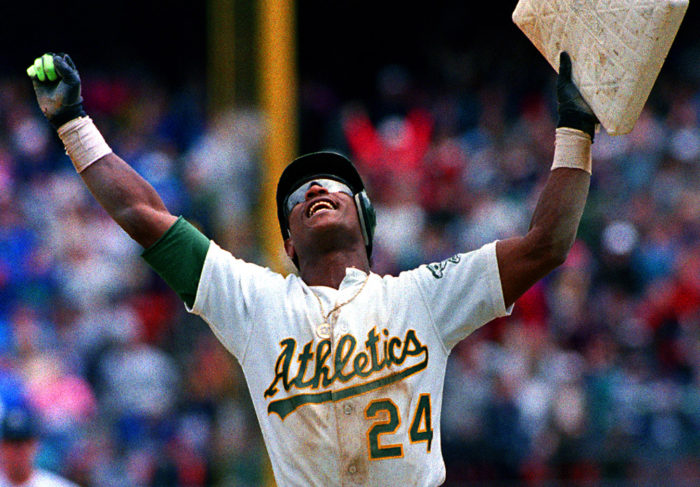
I had the privilege of speaking with Mahomes in early February, where we discussed pitching in Japan, his two seasons with the Mets and one of his favorite Rickey Henderson stories.
MMO: Growing up, who were some of your baseball idols?
Pat: When I was growing up my favorite players were Rickey Henderson – who I got to play with when I was with the Mets – Satchel Paige and Reggie Jackson.
MMO: Who introduced you to the game of baseball?
Pat: My father started me playing tee-ball when I was four-years-old. I got to play up and my father played kind of like semi-pro baseball pretty much all of his life. He was very instrumental in getting me started.
MMO: Did you primarily pitch growing up?
Pat: I mostly played other positions. I always could pitch and throw harder than the rest of the guys, but my father didn’t let me pitch that much. I basically just played shortstop.
MMO: At what point did you start pitching?
Pat: My junior year, halfway through the season. We had a guy that had pitched his whole life – since Little League – and his arm finally gave out on him. He called the head coach to the field and told him he wasn’t going to throw another inning. I was playing short and the coach said, “Okay, you’re up, Pat.”
That’s kind of how it started.
MMO: What are your memories from the 1988 MLB Draft? Did you have any notion of where you’d be selected and what teams had interest in you?
Pat: Well it was funny, my American Legion team had won state three years in a row and my junior year I was the MVP of the tournament: I went 12-for-13 with four bombs. The scouts took notice and they started coming. Everybody thought they were going to draft me as an outfielder.
Then that game where I started pitching when the guy decided he wasn’t going to pitch anymore, the scouts were there and they happened to have a radar gun. I was throwing 93 miles-per-hour, so then it kind of started spreading where some wanted me to pitch but most everyone wanted me to play outfield and hit.
I was going to get drafted as an outfielder. Even though I played shortstop, everybody knew that I was going to be too big to play shortstop. Back in those days, shortstops weren’t that big, so they were confident I could play outfield.
I was second in state in hitting my junior year and then I hit .583 my senior year.
MMO: Well that explains why you were such a good hitting pitcher in your career.
Pat: Oh, yeah. I mean, I’ve always hit. It’s pretty much the same way my son was; he was going to get drafted as a position player but he also pitched and threw 97-miles-per-hour in high school. But he was going to get drafted as an outfielder.
MMO: April 12, 1992: Your major league debut. What memories stand out from that day for you?
Pat: Pitching against my hometown team (Texas Rangers) on ESPN, giving up a three-run home run in the first and then pitching a pretty solid game after that and getting a no-decision (6 IP, 2 H, 3 R, 3 ER, 5 BB, 3 SO).
MMO: You were drafted and pitched your first several seasons in the majors as a starter. By 1995, you were more or less a reliever. What was that transition like for you?
Pat: I loved pitching out of the pen. A guy that was athletic as I was, I liked the idea of going to the field knowing I had a chance to play.
When I started I knew I had my one day to pitch, and then the other four days I was just going to be there watching. I didn’t really like that; I liked going to the field every day knowing that I might get some action.
MMO: You spent two seasons playing in Japan for the Yokohama Bay Stars (1997-98). What was that experience like for you and what were some of the differences you saw between both leagues?
Pat: It was a great experience, they’re very passionate about their baseball over there. I was fortunate enough to get to win a Japan World Series (1998).
I played with [Kazuhiro] Sasaki, who ended up being the closer for the Seattle Mariners. The way he went about his business brought a whole new level of work ethic for me, and I was able to transfer that when I got back to the Mets in 1999.
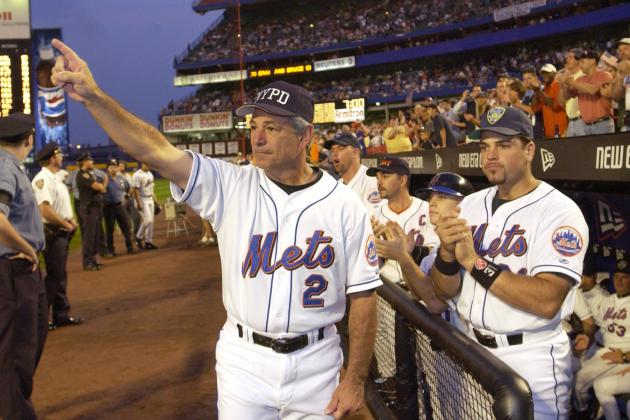
MMO: You signed with the Mets in December of 1998, and had one of the finest seasons of your career in 1999. What made that season so special do you think?
Pat: What really made that season for me was Bobby Valentine. It was the first time in my career that I had a manager that would just let me be me.
He put me in several different roles. He told me when I come to the ballpark to just be prepared to play. I didn’t have to be the long man, I might be the setup man, I might be whatever. Just be prepared to play.
He let me be Pat Mahomes, and that made everything just that much smoother for me.
MMO: Valentine was good with the communication aspect for you?
Pat: He just told me to come to the field ready to play, he didn’t have favorites. Whatever the situation called for, whatever move he thought he was going to make he made it, and there were no questions asked. You go out there and do your job.
The bullpen we had that year was so good we all had confidence in each other. We just knew that whatever position we were put in, go in and do your role and if by chance you happened to have a bad day you had a guy that was going to come in and pick you up.
MMO: You made your first Mets appearance on May 15 in Philadelphia. Al Leiter lasted just three innings after allowing six runs (five earned). You went 2.1 innings, allowing just two hits, one walk and striking out two. Was that first appearance something that gave you confidence early on for the rest of that year?
Pat: I just felt like I was home. I had played in the American League all the time and I got to play in the National League, which also gave me the opportunity to swing the bat a little bit.
Like I said, Bobby made everything. Even from spring training I just felt like that was the place I wanted to be and that was the place I always wanted to play at.
I did always want to play for the New York Mets, that was the team that was supposed to draft me out of high school. It just so happened that I got to get there and the stars aligned.
I went 8-0 for a great team, a team that should’ve won the World Series and I also get to hit above .300 that year.
MMO: You hit .313 with three doubles and three RBIs, that’s not too shabby.
Pat: Oh, yeah. Like I said, I hadn’t swung a bat in a long time, but it just felt great. Actually, I got to swing it in Japan a little bit when I started some games there.
It was just fun to be out there and to compete. I loved to compete and that [N.L.] gives you all phases of the game to get to compete in.
MMO: You mentioned the Mets were interested in possibly drafting you, were they looking at you as a pitcher or outfielder?
Pat: Outfielder.
MMO: Another big moment for you personally came in Game Six of the ’99 NLCS. You entered in the first inning after Leiter was lifted after giving up five earned runs. Talk to me about that game and what you were feeling entering that situation early on.
Pat: What stood out about that game was that I pitched two or three games in a row already, and I remember going down to the bullpen and Al Jackson – who I named my second son after – we were sitting in the bullpen.
I said, ‘Al, who do you think is going to be first up today?’ And he goes, “Probably you.”
About that time the phone rings [Laughs] and he said, “Mahomes.” And I’m like, we have Orel Hershiser, Kenny Rogers and [Octavio] Dotel down there and here I am coming into the first inning with the bases loaded and no outs? After pitching two or three days in a row!?
Once I started warming up and the lights came on that competitive edge came out and I just went in and did my job.
MMO: Were you a guy that liked pitching back-to-back days, or did you like having certain rest in between appearances?
Pat: I would pitch every day if I could. I mean, it didn’t really matter. Normally there was some kind of rotation but we were in a situation where it was do or die. We had to win the game and Bobby had a lot of confidence in me that year and it just made sense.
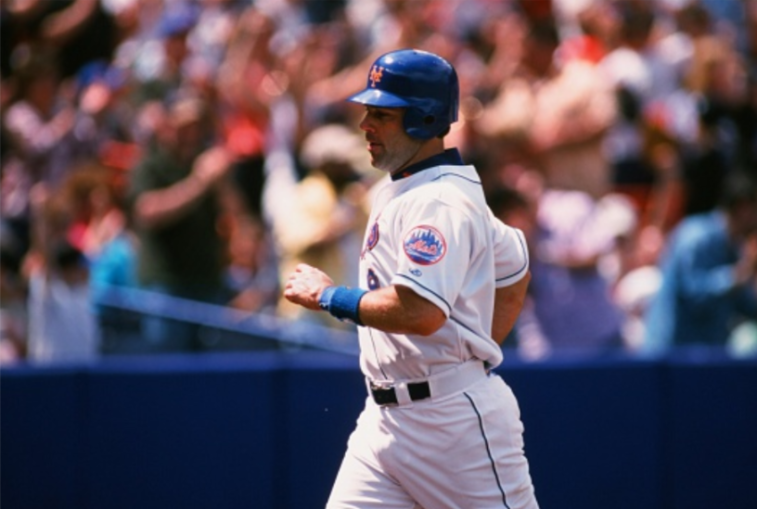
MMO: I’ve spoken to guys like Todd Zeile and Glendon Rusch, who both commented that the clubhouse camaraderie was a big reason why those 1999 and 2000 teams did so well. Do you agree with that assessment?
Pat: The 1999-2000 teams were better than the team that went to the World Series. We were all so close. Rusch, Zeile and all the guys from that 1999 and 2000 teams. You hear about baseball teams after the game getting into their own cabs, we went out together. We hung together, we ate together and we did it all. It was just great teams.
MMO: Looking back on your career, what moments stand out for you the most?
Pat: Game Six is definitely one, coming in there and leaving it where it was that year. Probably Robin Ventura’s home run, that grand slam single, that was pretty awesome.
One of the things I most liked was in 1999, having to win every game just to get into the playoffs, after playing so well the whole year. Having to win every game and pitching in those games, coming up big was pretty exciting.
MMO: What are some of the things you’ve been up to post-retirement from baseball?
Pat: I coach kids and do some pitching lessons. I also have a couple of teams that I coach and most of the time hanging around my kids. Going to their games and doing whatever they’re doing at that time.
MMO: You must be pretty proud of your son, Patrick Mahomes II, who was named the Kansas City Chiefs’ starting quarterback for the 2018-19 season.
Pat: I’m excited. Any time your kids get to realize their dreams it’s always an exciting time. I’m super proud and just glad of the man that he became.
MMO: Do you still keep in touch with any of your old teammates from your Met days?
Pat: Definitely. I talk to Rickey all the time and both Bobby Jones’. I’ve talked to Mike Piazza a few times. I try and stay in contact as much as possible.
MMO: Do you have any good Rickey stories you can share?
Pat: I was with Rickey every day and there are a lot of fun stories. Probably my favorite was in 2000 when he was a little upset and he wanted more money. He had signed a two-year deal and he had a really great year in 1999. The media caught wind of it and they were getting on him pretty bad and I talked to him and I said, ‘Rickey, everything you say they just write and turn it around. Why don’t you just not talk to the media for thirty days? And then we’ll get back at it after then?’
So the thirtieth day ends up coming and every day – my locker was right by his – and they’d come in and ask, “Is Rickey talking today?” I was like, ‘No, he’s not talking today.’
Well, it was thirty days and I said, ‘Okay, Rickey’s going to talk today.’
The first question a reporter asked him was, “Rickey, don’t you care about having a chance to win?” And Rickey goes, “What?! You better check the back of Rickey’s baseball card. Wherever Rickey goes, Rickey’s going to have a chance to win. And if not, on July 31st they’re going to come get Rickey. They’re playing on Rickey time.”
MMO: I appreciate your time today, Pat. Thanks for sharing some great stories from your career.
Pat: Thank you.
Follow Pat Mahomes on Twitter, @PMahomes


